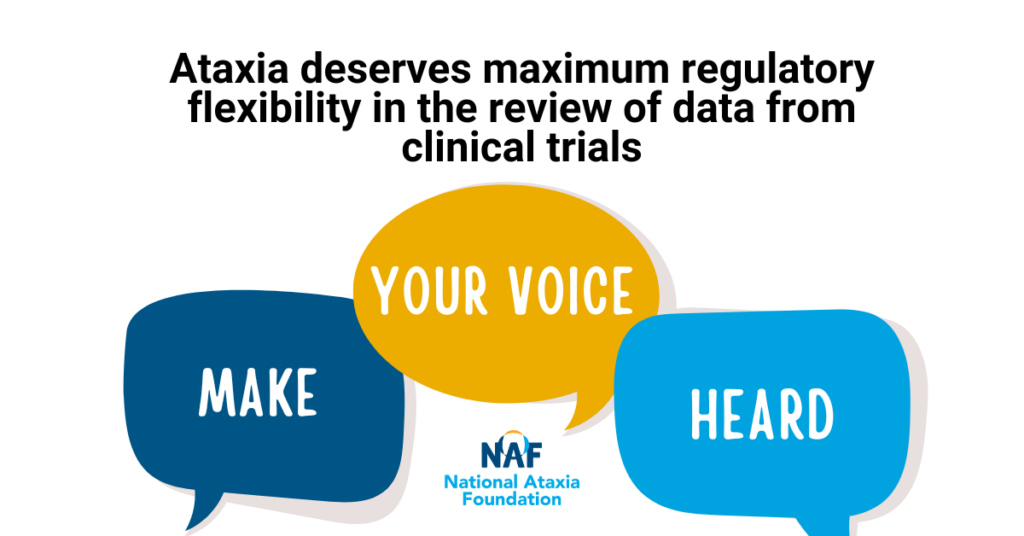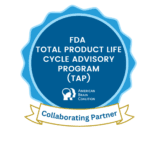Thank you for submitting your comments for the FDA!
Troriluzole, an experimental drug being developed by Biohaven, completed Phase 3 clinical trials last year. While the primary endpoint assessing benefit across all Spinocerebellar Ataxia (SCA) types was not met, Biohaven believes the results show benefit among participants with SCA Type 3 (SCA3). In May of this year, Biohaven submitted a New Drug Application (NDA) for troriluzole to treat SCA3. The U.S. Food and Drug Administration (FDA) recently issued a Refuse to File letter to Biohaven, which means that it did not accept the application and will not review the full data presented in the NDA.
Since this announcement, NAF has worked closely with regulatory experts, partner patient advocacy organizations, and Ataxia clinicians to learn more about why this happened, as well as explore precedent set by similar rare diseases who had potential treatments in similar situations. Based on what we learned, we are very discouraged by the FDA’s decision to Refuse to File the application for troriluzole and believe people with SCA3 deserve the opportunity to have the FDA consider the data in full, despite the fact that the primary endpoint was not met in the study. We believe reviewing the data in its totality is consistent with the FDA’s own policies for rare diseases like SCA3.
NAF Statement on Biohaven's RTF Letter from FDA
Since the founding of the National Ataxia Foundation in 1957, a core part of our mission has been to work to improve the lives of those living with Ataxia. In the past several years, we’ve expanded our work to include a focus on accelerating the development of treatments and a cure for this devastating set of diseases.
We have now come to a seminal moment for many in our community who suffer from Spinocerebellar Ataxia (SCA). It has been thirty years since the first specific genetic mutation was discovered for SCA, yet our community continues to wait for the first treatment to be available. As their condition advances and deprives them of the capacity to carry out everyday activities like walking and talking, and eventually taking their lives prematurely, they simply cannot wait any longer. People with SCA need a treatment –anything that has the potential to even incrementally slow the relentless progression of this condition or lessen symptoms. We heard this loud and clear at our September 2020 Externally-Led Patient-Focused Drug Development Meeting on Ataxia.
We ask that the FDA consider these perspectives from those who have the most to lose by having a potentially effective treatment be sidelined prematurely. Consider their serious unmet needs. Consider the irreversible progression that they will experience over the several years it would take to conduct another study and reapply to the FDA. Consider that people with SCA3 live with absolute certainty about their future, and so are willing to accept greater uncertainty when it comes to new drug treatments.
People with SCA3 deserve to have the full data on troriluzole reviewed, and with this patient input in mind. NAF is concerned the FDA’s decision to Refuse to File the application may amount to a false negative conclusion, denying patients access to a drug that works. Only a full review of the data would give us confidence that this is not the case.
NAF believes that FDA regulations and policies, as well as previous review of other drugs for rare diseases, support reviewing the troriluzole NDA.
SCA3 is a rare condition with approximately 5,000 people known to have the condition in the United States. It is well-established in FDA regulation and policy that rare diseases face unique challenges in drug development that make it harder to design and conduct clinical trials that definitely confirm a drug benefit. Some of these common challenges are present in SCA3: (1) there is a limited patient population who can enroll in clinical trials; (2) there is often a slow progression of the disease which makes it harder to show a slowing of progression; and (3) there is a lack of well-established clinical endpoints or biomarkers, adding variability or noise to the assessments. The presence of these challenges demands a more flexible approach. Rare diseases must be considered differently than more prevalent conditions.
Especially when combined with the serious unmet medical need, diseases like SCA3 deserve the maximum regulatory flexibility in the review of data from clinical trials.
FDA’s own policies say so. FDA’s 2019 Substantial Evidence of Effectiveness Draft Guidance says that “certain situations, such as when a disease is rare or the disease is life‐threatening or severely debilitating with an unmet medical need, may warrant additional flexibility.” SCA3 certainly meets all three of these criteria.
There is ample precedent set by the FDA for reviewing applications for drugs that did not meet their primary clinical endpoint. Most recently, in April of this year, FDA approved a drug, tofersen, for a type of amyotrophic lateral sclerosis (ALS), even though the primary endpoint did not come close to being achieved. Yet, in this case, the FDA chose to review the NDA, during which they considered other endpoints and analyses that ultimately supported approval.
We are asking for the same consideration in regulatory flexibility that has been given to other rare neurodegenerative and genetic conditions, such as ALS, Duchenne muscular dystrophy (DMD), Batten disease, and MPS.
NAF calls on the FDA to apply appropriate regulatory flexibility and to accept and review the NDA for troriluzole.
We have the utmost respect for the FDA’s role in ensuring that drugs approved in the United States are both safe and effective. We share this goal with the FDA. However, the ultimate approval decision on troriluzole should come after a thorough review of the clinical trial results and other information submitted by Biohaven in the NDA. The SCA community’s need for a treatment is both urgent and great, so careful consideration of the totality of the data, taking into account patient experiences and preferences, is deserved.
Request for Comments Regarding Regulatory Flexibility for SCA3
NAF plans to deliver this statement to FDA in the near future. As part of this, we want to represent your voice to the FDA too! We want to ensure the FDA hears from individuals with Ataxia, their family members and other care partners, clinicians, and more, since any decision FDA makes will impact you and your loved ones. FDA needs to hear from the members of this community on key topics that may help FDA understand why applying regulatory flexibility is warranted and why reviewing the full clinical trial data is in the best interest of patients.
To make your voice heard, NAF collected your feedback to be included in our outreach to the FDA. We will release the package publicly after it has been submitted to the FDA.

















